#max7219
Explore tagged Tumblr posts
Text
16x16 LED Matrix am Arduino UNO

In diesem Beitrag möchte ich dir erläutern, wie du eine 16x16 LED Matrix an den Arduino UNO anschließt und programmierst.

16x16 LED Matrix am Arduino UNO Die LED Matrix mit MAX7219 Treiberchip habe ich dir bereits in einigen Beiträgen vorgestellt, hier soll es nun speziell um die 16x16 Version gehen. - Arduino Projekt: Temperaturanzeige auf einer 8x8 LED Matrix - Arduino Lektion 8: Max7219 8x8 LED Shield Das hier verwende Modul verfügt über 4 Stück von 8x8 LED Matrix Modulen, welche im Quadrat angeordnet sind.



Bezug der 16x16 LED Matrix
Das mir vorliegende Modul habe ich recht günstig über aliexpress.com gekauft, die Lieferzeit war hier wie bei diesem Shop bekannt recht lange. Du bekommst dieses Modul aber auch auf ebay.de. Zu dem Zeitpunkt wo ich den Beitrag schreibe ist dieses Modul leider nicht auf ebay.de erhältlich, daher kann ich dir keinen genauen Preis nennen.
Anschluss des 16x16 LED Matrix Moduls an den Arduino
Bevor ich dieses Modul anschließen konnte, musste ich zunächst eine 5polige Stiftleiste an die Platine löten. Auf der Platine gibt es diverse Stellen, wo man theoretisch diese Stiftleiste anlöten könnte, ABER es gibt für diese nur eine richtige Position. Um diese richtige Position zu bestimmen, müssen wir nur schauen, wo auf der Platine ein Pfeil mit "IN" steht. Problem hierbei, das auf der linken Seite des Moduls zwei Anschlüsse mit "IN" gibt, in meinem Fall habe ich den oberen der beiden verwenden müssen. Die Pins der LED Matrix werden wie nachfolgend aufgeführt mit dem Arduino verbunden: 16x16 LED MatrixArduino UNOVCC5 VGNDGNDDIND11CSD7CLKD13

Anordnung der LED Matrix Module
In der nachfolgenden Grafik habe ich einmal die LED Matrix Module nummeriert. Diese Anordnung benötigen wir für die Programmierung der gesamten Matrix!

Programmieren der 16x16 LED Matrix in der Arduino IDE 2.0
Kommen wir nun dazu, diese LED Matrix in der neuen Arduino IDE 2.0 zu programmieren. Installieren der benötigten Bibliothek Für das Ansteuern der LED Matrix Module benötigen wir eine Bibliothek. Diese können wir recht einfach über den Bibliotheksverwalter der Arduino IDE installieren. Wir müssen lediglich nach "ledControl" suchen und gleich der erste Eintrag "LedControl by Eberhard Fahle" ist die korrekte, welche wir installieren.


Wenn diese Bibliothek installiert wurde, erscheint der kleine Hinweis "INSTALLED" und wir können mit der Programmierung beginnen.
Beispielprogramm
Nachfolgend möchte ich dir ein kleines Beispielprogramm zeigen. Die Arrays mit den Daten kannst du mit meinem 16x16 LED Matrix - Generator recht einfach erstellen und hast somit keine Mühe diese zu erstellen. //Bibliothek zum ansteuern der LED Matrix //mit MAX7219 Treiberchip #include //Anschluss der LED Matrix an den Arduino int DIN = 11; int CS = 7; int CLK = 13; //Initialisieren eines Objektes vom Typ //LedControl mit den Pins und der Anzahl 4 //für die angeschlossenen LED Matrix Module LedControl lc = LedControl(DIN, CLK, CS, 4); //Konstante mit den maximalen Zeilen pro LED Matrix const int MAX_ROWS = 8; //Arrays mit den Daten pro Zeile byte matrixModul1 = { B01000001, B10000001, B00000010, B00000010, B11100100, B00001000, B00110000, B11000000 }; byte matrixModul2 = { B10000010, B10000001, B01000000, B01000000, B00100111, B00010000, B00001100, B00000011 }; byte matrixModul3 = { B11000000, B00110000, B00011000, B00000100, B00110010, B00110010, B00000001, B00000001 }; byte matrixModul4 = { B00000011, B00001100, B00011000, B00100000, B01001100, B01001100, B10000000, B10000000 }; void setup() { lc.shutdown(0, false); lc.shutdown(1, false); lc.shutdown(2, false); lc.shutdown(3, false); //setzen der Lichtintensität der LEDs lc.setIntensity(0, 6); lc.setIntensity(1, 6); lc.setIntensity(2, 6); lc.setIntensity(3, 6); //leeren der LED Matrix Module lc.clearDisplay(0); lc.clearDisplay(1); lc.clearDisplay(2); lc.clearDisplay(3); } //Funktion zum aktivieren der LEDs an //einem LED Matrix Modul void drawLine(int matrix, byte data) { for (int row = 0; row < MAX_ROWS; row++) { lc.setRow(matrix, row, data); } } void loop() { drawLine(0, matrixModul1); drawLine(1, matrixModul2); drawLine(2, matrixModul3); drawLine(3, matrixModul4); delay(5000); lc.clearDisplay(0); lc.clearDisplay(1); lc.clearDisplay(2); lc.clearDisplay(3); } Read the full article
0 notes
Text
Display modules are widely used throughout the industry to show the data to the user or to give indication and warnings to the user. It makes the interface user friendly even if he is not of technical background and makes it easier for him to control the activity without the need of an expert. One main problem with LED displays is that they use many interfacing connections to connect with the microcontroller or development board you are using and thus it is left with shortage of pins to connect with other modules. This MAX7219 Dot Matrix Module LED display solves this problem the use of MAX7219 LED Display driver which converts the serial data coming from the microcontroller to the parallel data to the LED Matrix Module. Thus you can control all 64 LEDs by using just 3 pins on your microcontroller board. Also, this is a 4 in 1 dot matrix module which means it has four 8×8 LED display modules which is again only controlled by 3 connection wires. The data for each LED is stored in 8×8 RAM onboard and can be accessed individually.
2 notes
·
View notes
Text
This Week in Rust 510
Hello and welcome to another issue of This Week in Rust! Rust is a programming language empowering everyone to build reliable and efficient software. This is a weekly summary of its progress and community. Want something mentioned? Tag us at @ThisWeekInRust on Twitter or @ThisWeekinRust on mastodon.social, or send us a pull request. Want to get involved? We love contributions.
This Week in Rust is openly developed on GitHub and archives can be viewed at this-week-in-rust.org. If you find any errors in this week's issue, please submit a PR.
Updates from Rust Community
Official
Announcing Rust 1.72.0
Change in Guidance on Committing Lockfiles
Cargo changes how arrays in config are merged
Seeking help for initial Leadership Council initiatives
Leadership Council Membership Changes
Newsletters
This Week in Ars Militaris VIII
Project/Tooling Updates
rust-analyzer changelog #196
The First Stable Release of a Memory Safe sudo Implementation
We're open-sourcing the library that powers 1Password's ability to log in with a passkey
ratatui 0.23.0 is released! (official successor of tui-rs)
Zellij 0.38.0: session-manager, plugin infra, and no more offensive session names
Observations/Thoughts
The fastest WebSocket implementation
Rust Malware Staged on Crates.io
ESP32 Standard Library Embedded Rust: SPI with the MAX7219 LED Dot Matrix
A JVM in Rust part 5 - Executing instructions
Compiling Rust for .NET, using only tea and stubbornness!
Ad-hoc polymorphism erodes type-safety
How to speed up the Rust compiler in August 2023
This isn't the way to speed up Rust compile times
Rust Cryptography Should be Written in Rust
Dependency injection in Axum handlers. A quick tour
Best Rust Web Frameworks to Use in 2023
From tui-rs to Ratatui: 6 Months of Cooking Up Rust TUIs
[video] Rust 1.72.0
[video] Rust 1.72 Release Train
Rust Walkthroughs
[series] Distributed Tracing in Rust, Episode 3: tracing basics
Use Rust in shell scripts
A Simple CRUD API in Rust with Cloudflare Workers, Cloudflare KV, and the Rust Router
[video] base64 crate: code walkthrough
Miscellaneous
Interview with Rust and operating system Developer Andy Python
Leveraging Rust in our high-performance Java database
Rust error message to fix a typo
[video] The Builder Pattern and Typestate Programming - Stefan Baumgartner - Rust Linz January 2023
[video] CI with Rust and Gitlab Selfhosting - Stefan Schindler - Rust Linz July 2023
Crate of the Week
This week's crate is dprint, a fast code formatter that formats Markdown, TypeScript, JavaScript, JSON, TOML and many other types natively via Wasm plugins.
Thanks to Martin Geisler for the suggestion!
Please submit your suggestions and votes for next week!
Call for Participation
Always wanted to contribute to open-source projects but did not know where to start? Every week we highlight some tasks from the Rust community for you to pick and get started!
Some of these tasks may also have mentors available, visit the task page for more information.
Hyperswitch - add domain type for client secret
Hyperswitch - deserialization error exposes sensitive values in the logs
Hyperswitch - move redis key creation to a common module
mdbook-i18n-helpers - Write tool which can convert translated files back to PO
mdbook-i18n-helpers - Package a language selector
mdbook-i18n-helpers - Add links between translations
Comprehensive Rust - Link to correct line when editing a translation
Comprehensive Rust - Track the number of times the redirect pages are visited
RustQuant - Jacobian and Hessian matrices support.
RustQuant - improve Graphviz plotting of autodiff computational graphs.
RustQuant - bond pricing implementation.
RustQuant - implement cap/floor pricers.
RustQuant - Implement Asian option pricers.
RustQuant - Implement American option pricers.
release-plz - add ability to mark Gitea/GitHub release as draft
zerocopy - CI step "Set toolchain version" is flaky due to network timeouts
zerocopy - Implement traits for tuple types (and maybe other container types?)
zerocopy - Prevent panics statically
zerocopy - Add positive and negative trait impl tests for SIMD types
zerocopy - Inline many trait methods (in zerocopy and in derive-generated code)
datatest-stable - Fix quadratic performance with nextest
Ockam - Use a user-friendly name for the shared services to show it in the tray menu
Ockam - Rename the Port to Address and support such format
Ockam - Ockam CLI should gracefully handle invalid state when initializing
css-inline - Update cssparser & selectors
css-inline - Non-blocking stylesheet resolving
css-inline - Optionally remove all class attributes
If you are a Rust project owner and are looking for contributors, please submit tasks here.
Updates from the Rust Project
366 pull requests were merged in the last week
reassign sparc-unknown-none-elf to tier 3
wasi: round up the size for aligned_alloc
allow MaybeUninit in input and output of inline assembly
allow explicit #[repr(Rust)]
fix CFI: f32 and f64 are encoded incorrectly for cross-language CFI
add suggestion for some #[deprecated] items
add an (perma-)unstable option to disable vtable vptr
add comment to the push_trailing function
add note when matching on tuples/ADTs containing non-exhaustive types
add support for ptr::writes for the invalid_reference_casting lint
allow overwriting ExpnId for concurrent decoding
avoid duplicate large_assignments lints
contents of reachable statics is reachable
do not emit invalid suggestion in E0191 when spans overlap
do not forget to pass DWARF fragment information to LLVM
ensure that THIR unsafety check is done before stealing it
emit a proper diagnostic message for unstable lints passed from CLI
fix races conditions with SyntaxContext decoding
fix waiting on a query that panicked
improve note for the invalid_reference_casting lint
include compiler flags when you break rust;
load include_bytes! directly into an Lrc
make Sharded an enum and specialize it for the single thread case
make rustc_on_unimplemented std-agnostic for alloc::rc
more precisely detect cycle errors from type_of on opaque
point at type parameter that introduced unmet bound instead of full HIR node
record allocation spans inside force_allocation
suggest mutable borrow on read only for-loop that should be mutable
tweak output of to_pretty_impl_header involving only anon lifetimes
use the same DISubprogram for each instance of the same inlined function within a caller
walk through full path in point_at_path_if_possible
warn on elided lifetimes in associated constants (ELIDED_LIFETIMES_IN_ASSOCIATED_CONSTANT)
make RPITITs capture all in-scope lifetimes
add stable for Constant in smir
add generics_of to smir
add smir predicates_of
treat StatementKind::Coverage as completely opaque for SMIR purposes
do not convert copies of packed projections to moves
don't do intra-pass validation on MIR shims
MIR validation: reject in-place argument/return for packed fields
disable MIR SROA optimization by default
miri: automatically start and stop josh in rustc-pull/push
miri: fix some bad regex capture group references in test normalization
stop emitting non-power-of-two vectors in (non-portable-SIMD) codegen
resolve: stop creating NameBindings on every use, create them once per definition instead
fix a pthread_t handle leak
when terminating during unwinding, show the reason why
avoid triple-backtrace due to panic-during-cleanup
add additional float constants
add ability to spawn Windows process with Proc Thread Attributes | Take 2
fix implementation of Duration::checked_div
hashbrown: allow serializing HashMaps that use a custom allocator
hashbrown: change & to &mut where applicable
hashbrown: simplify Clone by removing redundant guards
regex-automata: fix incorrect use of Aho-Corasick's "standard" semantics
cargo: Very preliminary MSRV resolver support
cargo: Use a more compact relative-time format
cargo: Improve TOML parse errors
cargo: add support for target.'cfg(..)'.linker
cargo: config: merge lists in precedence order
cargo: create dedicated unstable flag for asymmetric-token
cargo: set MSRV for internal packages
cargo: improve deserialization errors of untagged enums
cargo: improve resolver version mismatch warning
cargo: stabilize --keep-going
cargo: support dependencies from registries for artifact dependencies, take 2
cargo: use AND search when having multiple terms
rustdoc: add unstable --no-html-source flag
rustdoc: rename typedef to type alias
rustdoc: use unicode-aware checks for redundant explicit link fastpath
clippy: new lint: implied_bounds_in_impls
clippy: new lint: reserve_after_initialization
clippy: arithmetic_side_effects: detect division by zero for Wrapping and Saturating
clippy: if_then_some_else_none: look into local initializers for early returns
clippy: iter_overeager_cloned: detect .cloned().all() and .cloned().any()
clippy: unnecessary_unwrap: lint on .as_ref().unwrap()
clippy: allow trait alias DefIds in implements_trait_with_env_from_iter
clippy: fix "derivable_impls: attributes are ignored"
clippy: fix tuple_array_conversions lint on nightly
clippy: skip float_cmp check if lhs is a custom type
rust-analyzer: diagnostics for 'while let' loop with label in condition
rust-analyzer: respect #[allow(unused_braces)]
Rust Compiler Performance Triage
A fairly quiet week, with improvements exceeding a small scattering of regressions. Memory usage and artifact size held fairly steady across the week, with no regressions or improvements.
Triage done by @simulacrum. Revision range: d4a881e..cedbe5c
2 Regressions, 3 Improvements, 2 Mixed; 0 of them in rollups 108 artifact comparisons made in total
Full report here
Approved RFCs
Changes to Rust follow the Rust RFC (request for comments) process. These are the RFCs that were approved for implementation this week:
Create a Testing sub-team
Final Comment Period
Every week, the team announces the 'final comment period' for RFCs and key PRs which are reaching a decision. Express your opinions now.
RFCs
No RFCs entered Final Comment Period this week.
Tracking Issues & PRs
[disposition: merge] Stabilize PATH option for --print KIND=PATH
[disposition: merge] Add alignment to the NPO guarantee
New and Updated RFCs
[new] Special-cased performance improvement for Iterator::sum on Range<u*> and RangeInclusive<u*>
[new] Cargo Check T-lang Policy
Call for Testing
An important step for RFC implementation is for people to experiment with the implementation and give feedback, especially before stabilization. The following RFCs would benefit from user testing before moving forward:
No RFCs issued a call for testing this week.
If you are a feature implementer and would like your RFC to appear on the above list, add the new call-for-testing label to your RFC along with a comment providing testing instructions and/or guidance on which aspect(s) of the feature need testing.
Upcoming Events
Rusty Events between 2023-08-30 - 2023-09-27 🦀
Virtual
2023-09-05 | Virtual (Buffalo, NY, US) | Buffalo Rust Meetup
Buffalo Rust User Group, First Tuesdays
2023-09-05 | Virtual (Munich, DE) | Rust Munich
Rust Munich 2023 / 4 - hybrid
2023-09-06 | Virtual (Indianapolis, IN, US) | Indy Rust
Indy.rs - with Social Distancing
2023-09-12 - 2023-09-15 | Virtual (Albuquerque, NM, US) | RustConf
RustConf 2023
2023-09-12 | Virtual (Dallas, TX, US) | Dallas Rust
Second Tuesday
2023-09-13 | Virtual (Boulder, CO, US) | Boulder Elixir and Rust
Monthly Meetup
2023-09-13 | Virtual (Cardiff, UK)| Rust and C++ Cardiff
The unreasonable power of combinator APIs
2023-09-14 | Virtual (Nuremberg, DE) | Rust Nuremberg
Rust Nürnberg online
2023-09-20 | Virtual (Vancouver, BC, CA) | Vancouver Rust
Rust Study/Hack/Hang-out
2023-09-21 | Virtual (Charlottesville, NC, US) | Charlottesville Rust Meetup
Crafting Interpreters in Rust Collaboratively
2023-09-21 | Lehi, UT, US | Utah Rust
Real Time Multiplayer Game Server in Rust
2023-09-21 | Virtual (Linz, AT) | Rust Linz
Rust Meetup Linz - 33rd Edition
2023-09-25 | Virtual (Dublin, IE) | Rust Dublin
How we built the SurrealDB Python client in Rust.
Asia
2023-09-06 | Tel Aviv, IL | Rust TLV
RustTLV @ Final - September Edition
Europe
2023-08-30 | Copenhagen, DK | Copenhagen Rust Community
Rust metup #39 sponsored by Fermyon
2023-08-31 | Augsburg, DE | Rust Meetup Augsburg
Augsburg Rust Meetup #2
2023-09-05 | Munich, DE + Virtual | Rust Munich
Rust Munich 2023 / 4 - hybrid
2023-09-14 | Reading, UK | Reading Rust Workshop
Reading Rust Meetup at Browns
2023-09-19 | Augsburg, DE | Rust - Modern Systems Programming in Leipzig
Logging and tracing in Rust
2023-09-20 | Aarhus, DK | Rust Aarhus
Rust Aarhus - Rust and Talk at Concordium
2023-09-21 | Bern, CH | Rust Bern
Third Rust Bern Meetup
North America
2023-09-05 | Chicago, IL, US | Deep Dish Rust
Rust Happy Hour
2023-09-06 | Bellevue, WA, US | The Linux Foundation
Rust Global
2023-09-12 - 2023-09-15 | Albuquerque, NM, US + Virtual | RustConf
RustConf 2023
2023-09-12 | New York, NY, US | Rust NYC
A Panel Discussion on Thriving in a Rust-Driven Workplace
2023-09-12 | Minneapolis, MN, US | Minneapolis Rust Meetup
Minneapolis Rust Meetup Happy Hour
2023-09-14 | Seattle, WA, US | Seattle Rust User Group Meetup
Seattle Rust User Group - August Meetup
2023-09-19 | San Francisco, CA, US | San Francisco Rust Study Group
Rust Hacking in Person
2023-09-21 | Nashville, TN, US | Music City Rust Developers
Rust on the web! Get started with Leptos
2023-09-26 | Pasadena, CA, US | Pasadena Thursday Go/Rust
Monthly Rust group
2023-09-27 | Austin, TX, US | Rust ATX
Rust Lunch - Fareground
Oceania
2023-09-13 | Perth, WA, AU | Rust Perth
Rust Meetup 2: Lunch & Learn
2023-09-19 | Christchurch, NZ | Christchurch Rust Meetup Group
Christchurch Rust meetup meeting
2023-09-26 | Canberra, ACT, AU | Rust Canberra
September Meetup
If you are running a Rust event please add it to the calendar to get it mentioned here. Please remember to add a link to the event too. Email the Rust Community Team for access.
Jobs
Please see the latest Who's Hiring thread on r/rust
Quote of the Week
In [other languages], I could end up chasing silly bugs and waste time debugging and tracing to find that I made a typo or ran into a language quirk that gave me an unexpected nil pointer. That situation is almost non-existent in Rust, it's just me and the problem. Rust is honest and upfront about its quirks and will yell at you about it before you have a hard to find bug in production.
– dannersy on Hacker News
Thanks to Kyle Strand for the suggestion!
Please submit quotes and vote for next week!
This Week in Rust is edited by: nellshamrell, llogiq, cdmistman, ericseppanen, extrawurst, andrewpollack, U007D, kolharsam, joelmarcey, mariannegoldin, bennyvasquez.
Email list hosting is sponsored by The Rust Foundation
Discuss on r/rust
0 notes
Link
In this tutorial, we will walk you through the process of displaying your YouTube subscriber count on a MAX7219 8-Digit 7-Segment Display using an ESP32 Node MCU. Whether you’re a YouTuber looking to showcase live stats or an electronics enthusiast diving into IoT projects, this step-by-step guide is for you!
0 notes
Video
youtube
Дисплей MAX7219 Матричные для Arduino подключение и тест
1 note
·
View note
Text
Commonly used LED display driver chip and control system
Commonly used LED display driver chips include the following:
TPIC6B595: This is a serial input, parallel output LED display driver chip, suitable for driving 7 sections of digital tube and other simple LED display.
MAX7219/MAX7221: This is a common LED display driver that can drive an 8x8 dot matrix LED display. It has cascading function and can connect multiple drivers through serial interface to achieve large-scale LED display control.
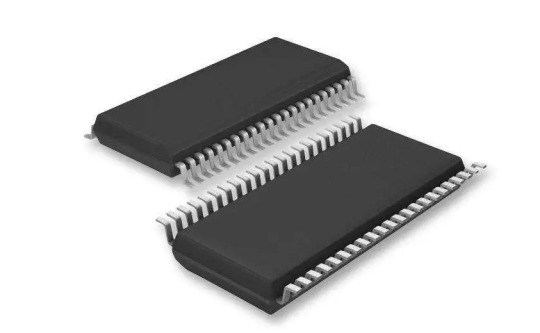
TM1637: This is a 4-bit nixtube driver chip with integrated controller and driver. It communicates with the microcontroller through I2C or SPI interface, simplifying the design of the drive nibtube.
HT16K33: This is a 16×8 lattice LED display driver chip, suitable for driving small LED display. It has I2C interface, which can easily communicate with microcontroller.
MBI5026/MBI5030/MBI5041: These are commonly used LED driver chip families for large indoor and outdoor LED displays. They have multiple output and gray adjustment function, can achieve high quality display effect.

It is important to note that the driver chip choice of LED display may be affected by the specific LED display type, specifications and requirements. Therefore, select a driver based on the application scenario and requirements, and refer to the technical documents and specifications of the driver. Free gift you 4 LED display chip knowledge.
Commonly used LED display control systems include the following:
Novastar: Novastar is a company specializing in LED display control systems. They offer a variety of control cards and control software for different sizes and types of LED displays. Novastar's control system is stable and compatible, and provides rich features and an easy-to-use interface.
Linsn: Linsn is another well-known supplier of LED display control systems. They offer a variety of models of control cards and control software for indoor and outdoor LED displays. Linsn's control system features high refresh rate, grayscale adjustment and brightness balance to achieve high-quality display results.
Colorlight: Colorlight is a company specializing in LED display control systems, they offer a variety of control cards and control software. Colorlight's control system has advanced grayscale processing and color management functions, which can achieve more accurate and realistic display effect.

Huidu: Huidu is a professional LED display control system supplier, offering a variety of models of control cards and control software. Huidu's control system has good stability and compatibility, suitable for a variety of application scenarios.
These LED display control systems usually include control cards (receiving cards), control software, and supporting equipment. They connect with the LED display through computers or other control devices to realize the control, adjustment and management of the display content. The specific control system selection should be based on the actual application requirements, type and size of the display screen. When selecting a control system, pay attention to its stability, compatibility, functionality, and ease of use, and ensure its compatibility and interoperability with the LED display.

Thank you for watching. I hope we can solve your problems. Sostron is a professional LED display manufacturer. We provide all kinds of displays, display leasing and display solutions around the world. If you want to know: Basic principle of LED display driver IC. Please click read.
Contact us on WhatsApp:https://api.whatsapp.com/send/?phone=8613570218702&text&type=phone_number&app_absent=0
0 notes
Text
Writing a python driver for the MAX7219 and finding slightly hidden features is a lot more interesting than this headline suggests.
Writing a python driver for the MAX7219 and finding slightly hidden features is a lot more interesting than this headline suggests.
This is the story about how I uncovered an undocumented or poorly documented chip feature to write a Python driver for a numeric display and used it on a Pi Pico W. If you just want the code – it is here. I’ve released it under the GNU GPL 3. The beginning I recently purchased two Hobby Components MAX7219 8 Digit Seven Segment Display Modules from Amazon. The manufacturer’s website has (C++)…

View On WordPress
1 note
·
View note
Text
Matriz de LED 8x8 con Arduino y driver MAX7219
1 note
·
View note
Photo

Custom 8*8 LED MATRIX Check bio... #led #arduino #arduinoprojects #electronicsprojects #electricalengineering #adafruit #instructables #diy #max7219 #easyelectronics #jlcpcb #linefollowerrobot https://www.instagram.com/p/Ca2MfACrHHJ/?utm_medium=tumblr
#led#arduino#arduinoprojects#electronicsprojects#electricalengineering#adafruit#instructables#diy#max7219#easyelectronics#jlcpcb#linefollowerrobot
0 notes
Text
Activity board: It's all about the code!

With the activity board controller finally in place and tested. It's time to throw together the actual firmware. Let's fire up VSCode!
VSCode has been my code editor of choice for quite a while now. Microsoft did a great job in developing a light weight but super powerful code editor. And with the advent of a PlatformIO VSCode extension, this makes for THE perfect Arduino IDE.

That being said, It's time to start working on the final firmware. Or actually: the final firmware for now. Because the Activity Board will probably be a project which will receive some (software) updates over time.

All the board's functionality will be seperated into a bunch of controllers. There is no particular reason why I called them controllers, It just sounds like I know what I'm doing. For now, the code consists of the following 5 controller classes:
InputController: Responsible for reading all the switch states by communicating with the MCP23017 over I2C.
SevenSegmentController: Controls the 7-segment display by communicating with the MAX7219 seven segment display.
NeopixelController: Controls all the WS2812B RGB-LEDs using the FastLED library.
LedController: Controls all the regular LEDs (incorporated in some of the buttons) using the Arduino GPIO pins.
CommunicationController: Sends JSON commands (like the buttons state updates) to a Raspberry Pi using the ArduinoJson library.
All of the controller classes have a setup() method which is called in the main.cpp setup routine, and most of the controllers have an update() method which is being called during the main run loop.
All of the update() methods are non blocking, to make sure the Activity Board stays responsive. Any necessary delays are implemented by using the elapsedMillis library. But every so often, I just simply count the update ticks to check if I need to do something.
if (tick++ % 100 == 0) { // do something every 100th cycle. }

Most of the controllers are pretty straight forward, and are just there as an easy to use wrapper for the respective libraries. The only controller that is a bit more exotic, is the InputController. To be honest, this controller gave me some headaches.
Don't interrupt me!
The MCP23017 I2C IO expander is capable of firing interrupts whenever one of the inputs changes. Because of this, I connected the two interrupt outputs of the MCP23017 to the Arduino interrupt pins (Pin 2 & 3). It turned out I only needed to connect one, since the MCP23017 can mirror the interrupt signal on both pins. Luckily this was just resulted in a redundant connection, and didn't caused any issues.
Unfortunately there was a bigger problem which I didn't forsee. While the MCP23017 is capable of triggering the Arduino's interrupt pin(s), I'm not able to read out the pin states in the interrupt service routines, since I2C uses interrupts itself, which aren't available in the interrupt service routines.

This means I can set a flag to request an update in the main loop, but I can never act on any input change in the service routine itself. Now for most of the inputs this is absolutely no problem, but for the rotary encoder I really need to check the state for both pin A and B. Now, if these two pins were both connected to the two different MCP23017 registers, I could have solved this with the two Arduino Interrupt pins. Or better yet. If I would have just connected the Rotary encoder directly to the Arduino's interrupt pins, it would have been even easier. But of course ... I didn't.
So after a lot of grumbling, I decided to give up on the interrupts for the rotary encoder (for now), and simply read out the MCP23017 data every run loop. I might mean the encoder wouldn't react as expected, but I could always make some hardware modifications later.
And with taking this easy route, reading the MCP23017 state was pretty straight forward, using Mizraith's fork of the Adafruit MCP23017 library:
// Initialize the library. Adafruit_MCP23017 mcp; // Configure the MCP23017. mcp.begin(); // Use default address 0. mcp.setGPIOABMode(0xFFFF); // All ports input. mcp.setGPIOABPullUp(0xFFFF); // All ports pull up. // Read out the 16 bits. unsigned int newState = mcp.readGPIOAB();
And then it turned out I spent way to much time in overthinking it. Since non of my other controllers is blocking the main run loop, fetching the current state up the buttons every loop is easily fast enough to handle any rotary encoder input. Once again, it turns out KISS is the best approach: Keep It Simple, Stupid!
And with that issue out the way, it was a matter of hooking up all the controllers in my main.cpp file. Whenever an input change, execute an action for that specific input.

This setup really enables me to easily add more actions to any of the buttons. Now and in the future.
And by sending any input change as a json object over the serial port, I can continue using the inputs in my future Raspberry Pi implementation.
For now, it just resulted in one awesome looking activity board with a lot of light effects!
Enjoy the show!
youtube
Now, if you are interested in all the fine detail of the code, you can check out the full source code on GitHub. Of course it's fully supplied with unit and integration tests (NOPE!). And it's fully and well documented (NOPE!). Check it it out in the ActivityBoardController repository!
Read all posts in this series:
Part 1: Enzo’s Control Room Part 2: Building the Box Part 3: Fire up the Lasers! Part 4: Spray Away! Part 5: Push the button! Part 6: Assembling the panel Part 7: The dial on the board goes round and round Part 8: Take control! Part 9: It’s all about the code! Part 10: Bake me some Pi! Part 11: The Final Touch
#vscode#platformio#activity#board#activityboard#arduino#mcp23017#max7219#ws2812b#ws2812#neopixel#raspberrypi#led#rotaryencoder#interrupts
4 notes
·
View notes
Text
Grove 8x8 LED Matrix am Arduino: Einsteigerfreundliche Programmieranleitung
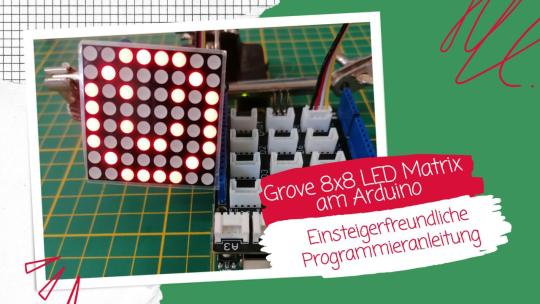
In diesem Beitrag möchte ich dir zeigen, wie du die Grove 8x8 LED Matrix am Arduino UNO R3 programmierst. Der Vorteil von diesem Modul ist es, dass du keine umständliche Verkabelung vornehmen musst, da die Grove Schnittstelle einheitlich ist und ein vorkonfektioniertes Kabel verwendet wird.
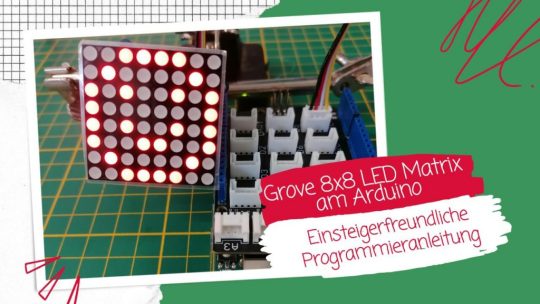
Grove 8x8 LED Matrix am Arduino: Einsteigerfreundliche Programmieranleitung Im Beitrag Arduino Lektion 8: Max7219 8×8 LED Shield habe ich dir bereits ein ähnliches Modul mit dem Chip MAX7219 vorgestellt. Hier soll es nun um eine Matrix mit dem Treiber HT16K33 gehen.

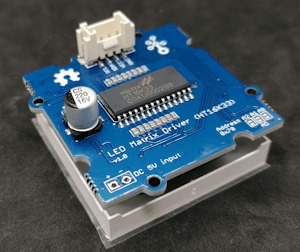
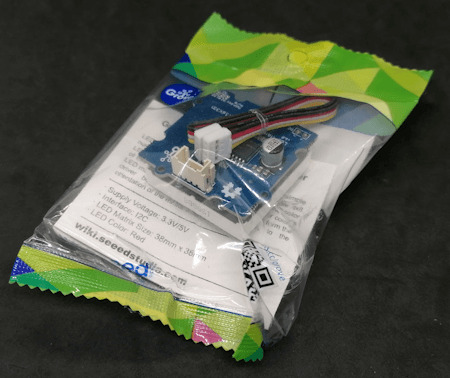
Bezug einer 8x8 LED Matrix mit Grove Schnittstelle
Das mir vorliegende Modul habe ich auf ebay.de für rund 9 € zzgl. Versandkosten erstanden. Du bekommst dieses Modul aber etwas günstiger bei BerryBase für derzeit 8 € zzgl. Versandkosten. Lieferumfang Im Lieferumfang der LED Matrix ist neben der Matrix noch ein kleines Grove Kabel für den Anschluss, sowie ein Zettel mit den wichtigsten technischen Daten.

Auf der LED Matrix ist noch eine kleine Schutzfolie, welche du abziehen kannst, ich lasse diese jedoch drauf.
Aufbau der 8x8 LED Matrix
Auf der Rückseite findest du die Grove Schnittstelle, sowie zwei Lötpunkte für die optionale externe Stromversorgung. Des Weiteren kannst du die I2C Adresse 0x70 via 3 Lötbrücken ändern.

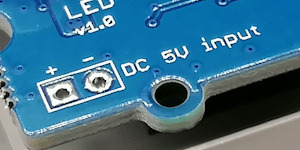

I2C Adressen via Lötbrücken Wenn du die Lötbrücken verbindest, dann kannst du diese Matrix über nachfolgende I2C Adressen ansteuern. Dabei kannst du auch mehrere Muster wählen und so zwischen 8 I2C Adressen auswählen. Verbundene PinsI2C Adresse-0x70A00x71A10x72A20x72A0 & A10x73A0 & A20x75A1 & A20x76A0, A1 & A20x77 Zur Ermittlung der I2C Adressen habe ich den I2C Scanner von https://playground.arduino.cc/Main/I2cScanner/ verwendet.
Zusätzliche Ressourcen für die Programmierung am Arduino
Damit du diese LED Matrix programmieren kannst, benötigst du entweder - ein Grove Adapterkabel, oder - ein Grove Base Shield für den Arduino UNO R3, oder - ein Seeeduino Nano
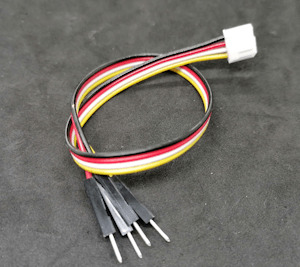
Grove Adapterkabel zu Breadboardpins

Grove Base Shield für den Arduino UNO R3
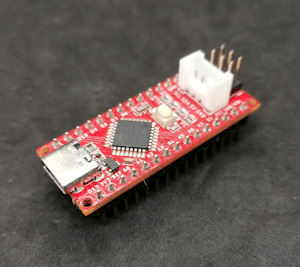
Seeeduino Nano Das Grove Base Shield hat mehrere Grove Buchsen digital & analog und somit bietet dieses eine sehr große Bandbreite an Möglichkeiten für Projekte. Wenn du lediglich die LED Matrix programmieren möchtest und du hast bereits einen Arduino Nano oder Arduino UNO dann
Programmieren der LED Matrix am Arduino via I2C
Damit die LED Matrix mit HT16K33 Treiber angesteuert werden kann, müssen wir in der Arduino IDE eine zusätzliche Bibliothek installieren. Diese können wir uns als ZIP-Datei vom GitHub Repository Seeed-Studio/Grove_LED_Matrix_Driver_HT16K33 herunterladen. Weitere Informationen zu diesem Modul findest du auf der englischen Wikiseite von Seeedstudio https://wiki.seeedstudio.com/Grove-LED_Matrix_Driver-HT16K33/. Anzeigen eines Smileys auf der LED Matrix Für die Erstellung eines Smileys kannst du den LED Matrix Editor unter https://xantorohara.github.io/led-matrix-editor/ verwenden. Dieser Onlineeditor gibt dir die Möglichkeit, mit der Maus auf der LED Matrix einzelne LEDs zu aktivieren / deaktivieren.
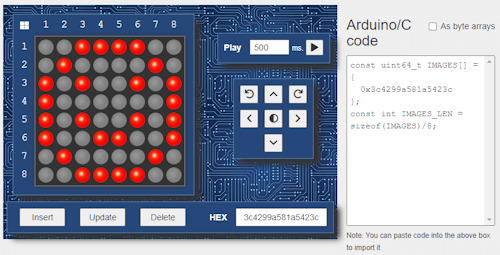
LED Matrix Editor von Xantorohara Auf der rechten Seite findest du ein Stück Code, welchen du in dein Arduino Programm integrieren kannst. In meinem Fall habe ich ein lachendes Smiley gezeichnet und erhalte den Wert "0x3c4299a581a5423c". Die Bibliothek liefert zusätzlich ein paar Beispiele, welche mit der default I2C Adresse 0x70 lauffähig sind. Von diesen Beispielen wähle ich zunächst "displaycustom_pictures" und modifiziere dieses etwas. //Bibliotheken zum kommunizieren mit der LED Matrix #include #include "Grove_LED_Matrix_Driver_HT16K33.h" //Wert für ein lachenden Smiley const uint64_t smiley = 0x3c4299a581a5423c; //instanz einer LED Matrix Matrix_8x8 matrix; void setup() { //beginn der I2C kommunikation Wire.begin(); //beginn der kommunikation mit der LED Matrix matrix.init(); //setzen der Helligkeit der Matrix //Werte sind zwischen 0 und 15 //wobei 0 dunkel ist und 15 das hellste matrix.setBrightness(5); //In welcher Frequenz die LED Matrix blinken soll, //Werte sind: //- BLINK_OFF > kein blinken, //- BLINK_1HZ > langsames blinken, //- BLINK_2HZ > schnelles blinken, matrix.setBlinkRate(BLINK_OFF); } void loop() { //anzeigen eines Bildes matrix.writeOnePicture(smiley); //absenden der Daten matrix.display(); //eine Pause von 10 Sekunden delay(10000); } Auf der Matrix hat man natürlich nur begrenzte Möglichkeiten zur Darstellung von Bildern, jedoch für so kleine Smileys und Pfeile ist dieses bestens geeignet.

lachender Smiley auf der 8x8 LED Matrix Ausgabe von Scrolltext auf der LED Matrix Da wie erwähnt die kleine LED Matrix nur begrenzten Platz für Zeichen bietet, gibt es die Möglichkeit Text auf diesem durchscrollen zu lassen. void loop() { //Funktion zum anzeigen eines Textes auf der LED Matrix, //Parameter: //String - die Zeichenkette welche ausgegeben werden soll, //Zahl - Wert in Millisekunden pro Zeichen //Typ //ACTION_SHIFT - jedes Zeichen einzeln anzeigen, //ACTION_SCROLLING - den Text durch die Matrix scrollen lassen matrix.writeString("Hallo Welt!", 1000, ACTION_SCROLLING); matrix.display(); } Damit ich das Video aufnehmen konnte, sodass meine Kamera den Text erfasst, habe ich ein kleines Tuch vor die LED Matrix gehängt.
Ändern der default I2C Adresse im Programm
Wenn du bereits Sensoren oder Aktoren am I2C Bus angeschlossen hast, dann kann es vorkommen, dass die default I2C Adresse der LED Matrix bereits belegt ist und du diese im Programm überschreiben musst. (Oder auch, wenn du mehrere solcher Matrixen an einem I2C Bus anschließen möchtest.) Dazu findest du in der Funktion setup den Aufruf der Funktion "matrix.ini();". Diese Funktion kann einen Parameter vom Typ uint8_t übernehmen und hat als default den Wert des Feldes HT16K33_DEFAULT_I2C_ADDR. #define HT16K33_DEFAULT_I2C_ADDR 0x70 Wir übergeben also nun den Hexadezimalen Wert, welchen wir aus der Tabelle (siehe I2C Adressen via Lötbrücken) entnehmen können. Und brauchen quasi in unserem Programm nichts weiter anpassen. matrix.init(0x71);
Vergleich zwischen 8x8 LED Matrix - MAX7219 & HT16K33
Zum Schluss möchte ich dir noch gerne die Unterschiede zur LED Matrix mit dem MAX7219 Chip aufzeigen. Diese LED Matrix verfügt ebenso wie die vorgestellte Matrix über 8x8 LEDs und kann ebenso einfach programmiert werden.
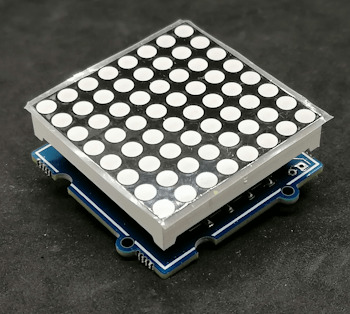
8x8 LED Matrix mit HT16K33 Treiberchip
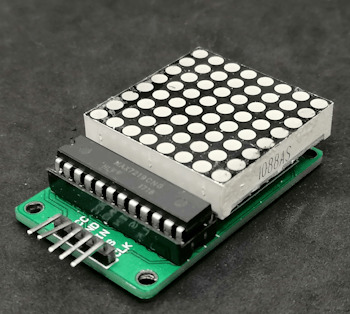
8x8 LED Matrix mit MAX7219 Treiberchip Jedoch kannst du diese Matrix zu mehreren zusammenstecken und so eine schier endlose Anzeige aufbauen.

MAX7219 Shields auf einem Stativ Die LED Matrix mit Grove Schnittstelle jedoch kannst du nicht so kaskadierend aufbauen und somit bist du mit dem Modul in deinen Möglichkeiten stärker beschränkt.
Fazit zur Programmierung der 8x8 LED Matrix mit Grove Schnittstelle am Arduino
Die LED Matrix von Seeedstudio mit Grove Schnittstelle und HT16K33 Treiberchip lässt sich super einfach programmieren. Du benötigst wenig Code und über die I2C Schnittstelle und dem Grovekabel hast du deutlich weniger Verkablung als bei der LED Matrix mit MAX7219, leider vermisse ich hier die Möglichkeit die Module kaskadierend zu verbinden und so ein langes Display für Laufschrift aufzubauen. Mit dem Online LED Matrix Editor kannst du dir jedoch recht einfach kleine Frames für die Matrix erstellen und in den Code kopieren. Ausblick Ich werde nun mal schauen, welche kleinen Projekte man mit dieser Matrix aufbauen kann. Jedoch würde ich eher zu einer RGB Matrix tendieren, denn diese kann bei gleicher Baugröße verschiedenfarbige Pixel anzeigen. Read the full article
0 notes
Text
The 8x8 Dot Matrix Display module consists of the 8x8 LED matrix display and the MAX7219 driver IC connected to it. It is very easy to interface with development boards like Arduino, Raspberry pi as 7219 IC uses only 3 pins to connect with your controller and drives all 64 LEDs in the module, thus saving the pins needed to connect all 64 LEDs.
1 note
·
View note
Text
This Week in Rust 463
Hello and welcome to another issue of This Week in Rust! Rust is a programming language empowering everyone to build reliable and efficient software. This is a weekly summary of its progress and community. Want something mentioned? Tweet us at @ThisWeekInRust or send us a pull request. Want to get involved? We love contributions.
This Week in Rust is openly developed on GitHub. If you find any errors in this week's issue, please submit a PR.
Updates from Rust Community
Official
Announcing the Rust Style Team
Foundation
Rust Foundation Project Grants are open for applications
Project/Tooling Updates
cargo careful: run your Rust code with extra careful debug checking
Async UI: a Rust UI Library where Everything is a Future
rust-analyzer changelog #149
Observations/Thoughts
How (and why) nextest uses tokio, part 1
in-place constructors
Quirks of Rust’s token representation
Brute forcing protected ZIP archives in Rust
This week in Fluvio #47: The programmable streaming platform
Rust Walkthroughs
How to call a C function from Rust (A simple FFI tutorial)
Rewriting the Modern Web in Rust
Implementing truly safe semaphores in rust
Model an ALU in Rust
6 things you can do with the Cow 🐄 in Rust 🦀
Platform Agnostic Drivers in Rust: MAX7219 Naive Code Refactoring
Last mile DynamoDB: Deno Deploy edition
Miscellaneous
The Initial Rust Infrastructure Has Been Merged Into Linux 6.1
Crate of the Week
This week's crate is humansize, a size formatting crate. Now in version 2.0, with an updated API.
Thanks, Leopold Arkham for the suggestion!
Please submit your suggestions and votes for next week!
Call for Participation
Always wanted to contribute to open-source projects but didn't know where to start? Every week we highlight some tasks from the Rust community for you to pick and get started!
Some of these tasks may also have mentors available, visit the task page for more information.
AeroRust website - Add an aerospace related crate #Hacktoberfest
nmea - Supporting additional sentences #Hacktoberfest
AeroRust website - Request for content
zerocopy - test_new_error fails on i686
zerocopy - test_as_bytes_methods fails on powerpc
zerocopy - Miri can't run tests for wasm32-wasi target
Ockam - Prototype UDP NAT hole punching
Ockam - Refactor ockam secure-channel listener create command to use rpc
Ockam - Split CBOR / Messaging API schema.cddl
If you are a Rust project owner and are looking for contributors, please submit tasks here.
Updates from the Rust Project
367 pull requests were merged in the last week
libc: add major/minor/makedev on apple OSes
miri: Add flag to specify the number of cpus
cargo: Iteratively construct target cfg
rustdoc-Json: List impls for primitives
clippy: Implement manual_clamp lint
clippy: Silence [question_mark] in const context
clippy: [manual_assert]: Preserve comments in the suggestion
clippy: [unnecessary_lazy_evaluations] Do not suggest switching to early evaluation when type has custom Drop
clippy: add box-default lint
clippy: fix [needless_borrow], [explicit_auto_deref] FPs on unions
clippy: let upper_case_acronyms check the enum name
clippy: let unnecessary_cast work for trivial non_literal expressions
clippy: lint nested patterns and slice patterns in needless_borrowed_reference
clippy: new implicit_saturating_add lint
rust-analyzer: Add proc-macro dependency to rustc crates
rust-analyzer: Fix PackageInformation having the crate name instead of package name
rust-analyzer: Fix annotations not resolving when lens location is set to whole item
rust-analyzer: Fix find_path using the wrong module for visibility calculations
rust-analyzer: Fix move_format_string_arg being tokentree unaware
rust-analyzer: Fix requests not being retried anymore
rust-analyzer: Fix trait impl item completions using macro file text ranges
rust-analyzer: Fix type alias hovers not rendering generic parameters
rust-analyzer: Use cfg(any()) instead of cfg(FALSE) for disabling proc-macro test
ci: Replace volta-cli/action with builtin functionality from actions/setup-node
docs.rs: new cache-policy & cache middleware structure to support full page caching
add #[rustc_safe_intrinsic]
add a niche to Duration, unix SystemTime, and non-apple Instant
add diagnostic struct for const eval error in rustc_middle
add negation methods for signed non-zero integers
added more const_closure functionality
adjust the s390x data layout for LLVM 16
compute lint levels by definition
fix #[derive(Default)] on a generic #[default] enum adding unnecessary Default bounds
fix format_args capture for macro expanded format strings
fix associated type bindings with anon const in GAT position
fix integer overflow in format!("{:.0?}", Duration::MAX)
generate synthetic region from impl even in closure body within an associated fn
get rid of exclude-list for Windows-only tests
serialize return-position impl Trait in trait hidden values in foreign libraries
stabilize #![feature(mixed_integer_ops)]
stabilize bench_black_box
use let-chaining in WhileTrue::check_expr
introduce {char, u8}::is_ascii_octdigit
macros: diagnostic derive on enums
add a filter for try commits in graphs, compare page and triage
codegen_gcc: Implement llvm.prefetch
codegen_gcc: simd: enable simd_as intrinsic
codegen_gcc: simd: implement float math intrinsics
allow users to debug their processes
Rust Compiler Performance Triage
A great week, with 170 primary benchmark scenarios seeing improvement. Every PR flagged by perf provided at least some wins, and perhaps more impressive: No rollup PR's were flagged by perf this week! Furthermore, cjgillot fixed an issue where incremental compilation was being unnecessarily hindered by our span and lint system. Great work everyone!
Triage done by @pnkfelix. Revision range: d9297d22..02cd79af
Full report here
Call for Testing
An important step for RFC implementation is for people to experiment with the implementation and give feedback, especially before stabilization. The following RFCs would benefit from user testing before moving forward:
No RFCs issued a call for testing this week.
If you are a feature implementer and would like your RFC to appear on the above list, add the new call-for-testing label to your RFC along with a comment providing testing instructions and/or guidance on which aspect(s) of the feature need testing.
Approved RFCs
Changes to Rust follow the Rust RFC (request for comments) process. These are the RFCs that were approved for implementation this week:
No RFCs were approved this week.
Final Comment Period
Every week, the team announces the 'final comment period' for RFCs and key PRs which are reaching a decision. Express your opinions now.
RFCs
No RFCs entered Final Comment Period this week.
Tracking Issues & PRs
[disposition: merge] make const_err a hard error
[disposition: merge] Elaborate supertrait bounds when triggering unused_must_use on impl Trait
[disposition: merge] Stabilize proc_macro Span::source_text
[disposition: merge] const-stablilize NonNull::as_ref
[disposition: merge] Add documentation about the memory layout of UnsafeCell<T>
[disposition: merge] Handle projections as uncovered types during coherence check
[disposition: merge] Never panic in thread::park and thread::park_timeout
[disposition: merge] Stabilize nonzero_bits
[disposition: merge] EscapeAscii is not an ExactSizeIterator
[disposition: merge] Change default level of INVALID_HTML_TAGS to warning and stabilize it
[disposition: merge] Add Box<[T; N]>: TryFrom<Vec<T>>
[disposition: merge] add no_compile doctest attribute
New and Updated RFCs
No New or Updated RFCs were created this week.
Upcoming Events
Rusty Events between 2022-10-05 - 2022-11-02 🦀
Virtual
2022-10-05 | Virtual (Indianapolis, IN, US) | Indy Rust
Indy.rs - with Social Distancing
2022-10-05 | Virtual (Stuttgart, DE) | Rust Community Stuttgart
Rust-Meetup
2022-10-06 | Virtual (Nürnberg, DE) | Rust Nuremberg
Rust Nürnberg online #18
2022-10-08 | Virtual | Rust GameDev
Rust GameDev Monthly Meetup
2022-10-11 | Virtual (Berlin, DE) | Open TechSchool Berlin
Rust Hack and Learn
2022-10-11 | Virtual (Dallas, TX, US) | Dallas Rust
Second Tuesday
2022-10-11 | Virtual (Saarbrücken, DE) | Rust-Saar
Meetup: 23u16
2022-10-11 | Virtual (Weiden, DE) | Digital Craftsmanship Nordoberpfalz
Woher kommt der Hype? Rust in 45 Minuten
2022-10-12 | Virtual (Boulder, CO, US) | Boulder Elixir and Rust
Monthly Meetup
2022-10-12 | Virtual (Erlangen, DE) | Rust Franken
Rust Franken Meetup #4
2022-10-12 | Virtual (San Francisco, CA, US / Redmond, WA, US / London, UK) | Microsoft Reactor San Francisco
Getting Started with Rust: Building Rust Projects | Redmond Reactor Mirror Event | London Reactor Mirror Event
2022-10-13 | Virtual (Berlin, DE) | EuroRust
EuroRust (Oct 13-14)
2022-10-15 | Virtual (Nürnberg, DE) | Rust Nuremberg
Deep Dive Session 2 (CuteCopter): Reverse Engineering a tiny drone
2022-10-18 | Virtual (Washington, DC, US) | Rust DC
Mid-month Rustful—Impractical Rust: The HATETRIS World Record
2022-10-19 | Virtual (Vancouver, BC, CA) | Vancouver Rust
Rapid Prototyping in Rust: Write fast like Python; Run fast like C
2022-10-20 | Virtual (Stuttgart, DE) | Rust Community Stuttgart
Rust-Meetup
2022-10-25 | Virtual (Dallas, TX, US) | Dallas Rust
Last Tuesday
2022-10-26 | Virtual (Redmond, WA, US) | Microsoft Reactor Redmond
Your First Rust Project: Rust Basics
2022-10-27 | Virtual (Charlottesville, VA, US) | Charlottesville Rust Meetup
Using Applicative Functors to parse command line options
2022-11-01 | Virtual (Buffalo, NY, US) | Buffalo Rust Meetup
Buffalo Rust User Group, First Tuesdays
2022-11-02 | Virtual (Indianapolis, IN, US) | Indy Rust
Indy.rs - with Social Distancing
2022-11-02 | Virtual (Redmond, WA, US / San Francisco, SF, US) | Microsoft Reactor Redmond
Getting Started with Rust: From Java Dev to Rust Developer | San Francisco Reactor Mirror Event | London Reactor Mirror Event
Asia
2022-10-11 | Tokyo, JP | Tokyo Rust Meetup
Cost-Efficient Rust in Practice
Europe
2022-10-06 | Wrocław, PL | Rust Wrocław
Rust Wrocław Meetup #29
2022-10-12 | Berlin, DE | Rust Berlin
Rust and Tell - EuroRust B-Sides
2022-10-13 | Berlin, DE + Virtual | EuroRust
EuroRust (Oct 13-14)
2022-10-25 | Paris, FR | Rust Paris
Rust Paris meetup #53
North America
2022-10-13 | Columbus, OH, US | Columbus Rust Society
Monthly Meeting
2022-10-18 | San Francisco, CA, US | San Francisco Rust Study Group
Rust Hacking in Person
2022-10-20 | New York, NY, US | Rust NYC
Anyhow ? Turbofish ::<> / HTTP calls and errors in Rust.
2022-10-20 | New York, NY, US | Cloud Native New York
Cloud-native Search Engine for Log Management and Analytics.
2022-10-25 | Toronto, ON, CA | Rust Toronto
Rust DHCP
2022-10-27 | Lehi, UT, US | Utah Rust
Bevy Crash Course with Nathan and Food!
Oceania
2022-10-10 | Sydney, NSW, AU | Rust Sydney
Rust Lightning Talks
2022-10-20 | Wellington, NZ + Virtual | Rust Wellington
Tune Up Edition: software engineering management
If you are running a Rust event please add it to the calendar to get it mentioned here. Please remember to add a link to the event too. Email the Rust Community Team for access.
Jobs
Please see the latest Who's Hiring thread on r/rust
Quote of the Week
BurntSushi is a super experienced programmer who always seems to know what’s right
Shepmaster occasionally pops up to keep things level, and provides definitive answers and edits to all stackoverflow questions
Epage is the ecosystem guy thanklessly maintaining the things that make the magic of cargo possible
Dtolnay is an AI written in rust with the sole purpose of improving rust.
– trevg_123 on r/rust
Thanks to musicmatze for the suggestion!
Please submit quotes and vote for next week!
This Week in Rust is edited by: nellshamrell, llogiq, cdmistman, ericseppanen, extrawurst, andrewpollack, U007D, kolharsam, joelmarcey, mariannegoldin, bennyvasquez.
Email list hosting is sponsored by The Rust Foundation
Discuss on r/rust
0 notes
Video
youtube
Display LAN & WAN Public IP on MAX7219 8-Digit 7-Segment Display with ES...
0 notes
Photo

Наконец добился хоть какрой-то адекватной работы на вторую ночь ковыряний и перетыкиваеием проводков. Дальше будем делать змейку. #arduino #max7219 #1088as https://www.instagram.com/p/B4_BRU-n5_k/?igshid=19s7sx43q599p
0 notes
Text
Interfacing a MAX7219 Driven LED Matrix with ATtiny85
Interfacing a MAX7219 Driven LED Matrix with ATtiny85

The MAX7219 controller is manufactured by Maxim Integrated is compact, serial input/output common-cathode display driver that could interface microcontrollers to 64 individual LEDs, 7-segment numeric LED displays of up to 8 digits, bar-graph displays, etc. Included on-chip are a BCD code-B decoder, multiplex scan circuitry, segment and digit drivers and an 8×8 static RAM that stores each digit.
View On WordPress
0 notes